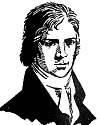|
When he was twenty-one his doctor advised him to go abroad for his health so he took this opportunity to join his old friend Benjamin West in England. As a protegé of West's, he soon had more requests for portraits and landscapes than he could paint. But as time went on he found himself drifting more and more into mechanical projects. He designed a mill or sawing marble, a flax spinning machine and a canal dredger.  Fulton disliked war and he had the unique idea that the way to end wars
would be to destroy all warships in existence, and do it as
quickly as possible. So he designed a torpedo and later built the
submarine Nautilus, adapting
some of the ideas, no doubt, of a contemporary, David Bushnell. While
in
France in connection with the submarine he made the acquaintance of
Robert Livingston, then United States minister to France.
Fulton disliked war and he had the unique idea that the way to end wars
would be to destroy all warships in existence, and do it as
quickly as possible. So he designed a torpedo and later built the
submarine Nautilus, adapting
some of the ideas, no doubt, of a contemporary, David Bushnell. While
in
France in connection with the submarine he made the acquaintance of
Robert Livingston, then United States minister to France.Livingston, with his brother-in-law, Colonel Stevens, and Nicholas Roosevelt had built several unsuccessful steamboats in America, yet they were still enthusiastic about the possibilities of steam navigation. Livingston and Fulton became close friends and in 1804 built a steamboat model - but the engine was so heavy that it quickly sank to the bottom of the River Seine. It was later raised and after many changes it worked fairly well, but above all, it convinced the two men that a successful full scale steamboat could be made. |








